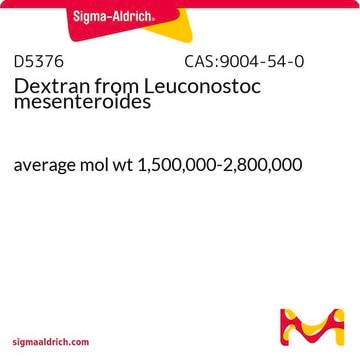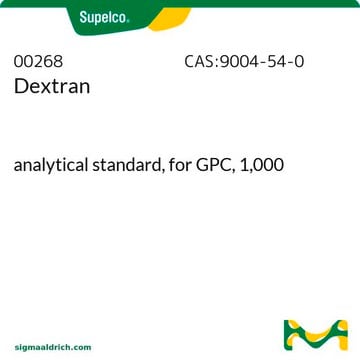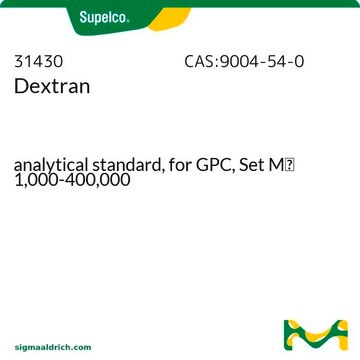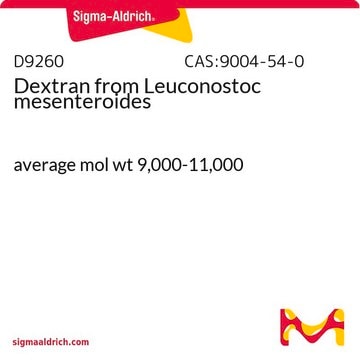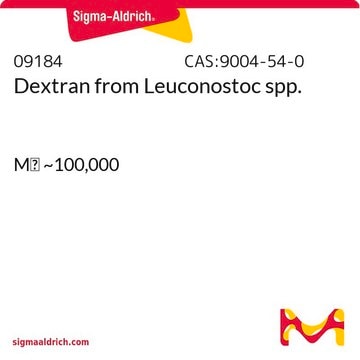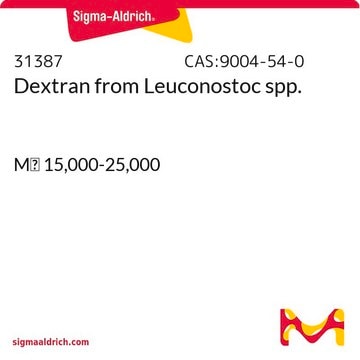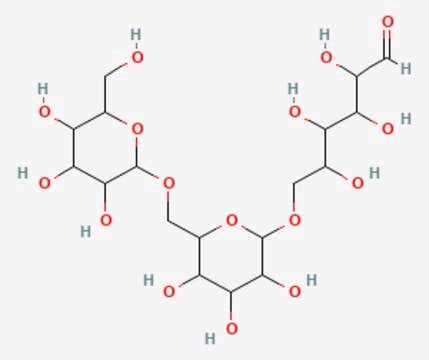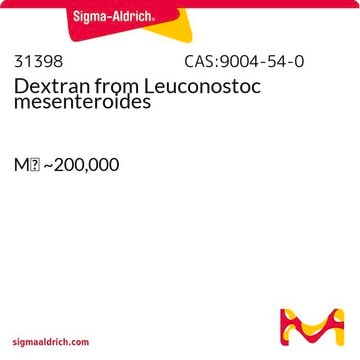31390
Dextran from Leuconostoc spp.
Mr ~70,000
Synonym(s):
DEXTRAN 70
About This Item
Recommended Products
biological source
(Leuconostoc spp)
form
powder
mol wt
Mr ~70,000
loss
≤7% loss on drying
color
white
mp
483 °C ((901 °F ))
solubility
water: 0.75 g/5mL, clear
absorption
≤0.05 at 375 nm in H2O at 10%
storage temp.
room temp
InChI
1S/C18H32O16/c19-1-5(21)9(23)10(24)6(22)3-31-17-16(30)14(28)12(26)8(34-17)4-32-18-15(29)13(27)11(25)7(2-20)33-18/h1,5-18,20-30H,2-4H2
InChI key
FZWBNHMXJMCXLU-UHFFFAOYSA-N
Looking for similar products? Visit Product Comparison Guide
General description
Application
- for the isolation of islets from pancreatic tissue by centrifugation
- as a component of Earle′s bicarbonate buffer for placental perfusion
- for the isolation of rat brain microvessels
Biochem/physiol Actions
Other Notes
Storage Class Code
11 - Combustible Solids
WGK
WGK 2
Personal Protective Equipment
Certificates of Analysis (COA)
Search for Certificates of Analysis (COA) by entering the products Lot/Batch Number. Lot and Batch Numbers can be found on a product’s label following the words ‘Lot’ or ‘Batch’.
Already Own This Product?
Find documentation for the products that you have recently purchased in the Document Library.
Customers Also Viewed
Articles
Centrifugation enables the separation of particles by sedimentation. Learn how to separate particles using a centrifuge and how to use Stokes' law to calculate the velocity of sedimentation.
Centrifugation enables the separation of particles by sedimentation. Learn how to separate particles using a centrifuge and how to use Stokes' law to calculate the velocity of sedimentation.
Centrifugation enables the separation of particles by sedimentation. Learn how to separate particles using a centrifuge and how to use Stokes' law to calculate the velocity of sedimentation.
Centrifugation enables the separation of particles by sedimentation. Learn how to separate particles using a centrifuge and how to use Stokes' law to calculate the velocity of sedimentation.
Related Content
Dextrans are polysaccharides with molecular weights ≥1,000 Dalton, featuring a linear backbone of α-linked d-glucopyranosyl repeating units.
Dextrans are polysaccharides with molecular weights ≥1,000 Dalton, featuring a linear backbone of α-linked d-glucopyranosyl repeating units.
Dextrans are polysaccharides with molecular weights ≥1,000 Dalton, featuring a linear backbone of α-linked d-glucopyranosyl repeating units.
Dextrans are polysaccharides with molecular weights ≥1,000 Dalton, featuring a linear backbone of α-linked d-glucopyranosyl repeating units.
Our team of scientists has experience in all areas of research including Life Science, Material Science, Chemical Synthesis, Chromatography, Analytical and many others.
Contact Technical Service



